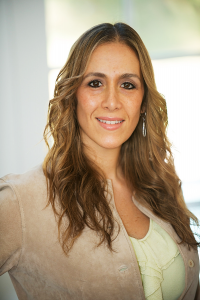Through my non-profit “Thru My Eyes” I interview parents who are faced with life threatening illnesses and enable them to leave a video legacy for their children and loved ones. People often ask me, how are you able to sit and speak with someone so intimately, while asking them some of the hardest questions and still remain composed and present while fully knowing what lies ahead for them?
I earnestly explain that it is truly a gift and an honor that I am invited into their home and that they open their heart and entrust me with the most intimate details of their lives. At intense emotional moments during an interview, I may become tearful as I become so deeply and emotionally impacted by their unique histories and experiences. They respond to my emotionality by playfully expressing, “I don’t know how you do this, I would have been crying much sooner.” We connect over my empathy and their warmth and kindness.
I attempted to reach out to a 44 year old male whose interview had to be cancelled the prior week because he was suddenly hospitalized. His wife got in touch and informed me that he was sent home with home hospice because his health had regressed so rapidly and to the point where he was barely conscious and able to carry a conversation. She reported that she had really wanted the video legacy for her two young children, ages thirteen and nine, but at this point it was too late for him to be interviewed. She regretted that he had waited so long to come to the decision, but she also realized that it inevitably was his decision to make.
During my years of group therapy training, I joined a psychotherapy group for psychotherapists. The group therapist/leader was an esteemed leader and educator in the field. During our group sessions, the group members, including myself, witnessed signs of decline in his health. When we expressed our concern to him, he readily disclosed his battle with cancer. Eventually and suddenly, when he was unable to work with us, we met at his home to show our support and express our concerns about never having gotten the opportunity to appropriately and effectively plan our termination and transition to another group. He shared that he was having a challenging time facing his illness and reassured us that he would seek his own treatment to explore and work through why he was struggling.
Upon his death and when we went to pay our condolences, his wife disclosed to us that he did attend one treatment session with her being there along-side him and that throughout the session he refused to have any dialogue in regard to his illness. He sat idly as she shared with the therapist. She expressed to us, “He just couldn’t do it. He loved life way too much to face that he wouldn’t be part of it all anymore.” Through her expression of his sentiments and thoughts, my expectations and feelings shifted. I recognized that my expectations focused around my ideals about his professionalism rather than his humanity. I truly appreciated his desire and need to live and continue to love life until the very last minute. He committed to never losing his will to live and veraciously stood by that.
Like so many, people choose to approach the very act of videotaping with reluctance and fear, feeling it is an inevitable “death sentence” and that they are making a personal statement in regard to “giving up their will to live.” Even through reassurance and explanation that it is similar to taking out a life insurance policy and that it is done as a precaution but never with the idea that it will ever inevitably need to be utilized, people still tend to be reluctant to committing to the process. Unfortunately, way too often delay is fraught with regret because it is too far into the progression of their illness and the window of opportunity, where they are well enough to communicate their personal story, is missed.
I wonder about the factors that contribute to the way individuals cope and respond to their devastating prognosis. There are those individuals who seem accepting of their inevitable death and are generally open to receiving support from others and sharing in their challenges. There are those individuals who are extremely private about their illness and share with relatively few. There are still others who seem in denial of their fate up until or very close to their death. This directly impacts how quickly they contact us and whether they are effectively able to follow through with the videotaping process.
I also ponder about the various ways that individuals choose to inevitably conduct their videotaping. Some opt to share intrinsic details of their lives based on the questions they have selected to address. Others prefer a combined approach of sharing details of their lives and talking directly into the camera to specific beloved family members and friends. While others want to spend their time entirely speaking directly into the camera to selected family members and friends. The approach differs from person to person based on their desires and needs.
Dede, a 40 year old female with an 8 year old daughter who was the inspiration for the creation of the Foundation and who it is dedicated to, was an incredibly vibrant, optimistic and joyful person. She showed up to the gym exuding this persona right up to and until her very last days. I personally observed her struggle and spoke to her about the challenges she was experiencing and those she expected her family to endure following her death. One day I asked her, “How is it that you remain so gracious, cheerful and joyful given what you’re going through?” She responded, “When I knew how grave my situation was I decided I can either leave this earth being depressed, sad and angry or I can choose to be appreciative, happy and feel loved and I decided that I’m opting for the latter and that every day I would dedicate my life to living that way no matter what.” I was so moved by her words. She held true to the commitment she had made to herself.
I can relate to many of the people I interview because of being close to their age and having children of similar ages. I leave each experience with further gratitude for my life and health and contemplate how I might handle it if I were in their position. I speak from a place of what I hope and imagine for. I grasp the idea and agree that “you never truly know” until you find yourself in that position. For me, I would hope and imagine organizing a living funeral where I preemptively would be able to openly and candidly express myself to those I love. I imagine getting in touch with and feeling gratitude for every day I had left and would speak openly about my impending death and allow others to express themselves as well if they desired to. For now… I will try my best to live in the moment, have gratitude for the life I live and commit to that life no matter what.
About the Author: Michelle P. Maidenberg, PhD
Michelle P. Maidenberg, Ph.D., MPH, LCSW-R, CGP is the President/Clinical Director of Westchester Group Works, a Center for Group Therapy in Harrison, NY. She also maintains a private practice. She is the Co-Founder and Clinical Director of “Thru My Eyes” a nonprofit 501c3 organization that offers free clinically-guided videotaping to chronically medically ill individuals who want to leave video legacies for their children and loved ones.
Dr. Maidenberg is Adjunct Faculty at New York University (NYU). She created and coordinates the Cognitive-Behavioral Therapy Program at Camp Shane, a health & weight management camp for children and teens in NY, AZ, GA, CA & TX and Shane Resorts, a resort focusing on health & weight management for young adults and adults in NY & TX. She is author of “Free Your Child From Overeating” 53 Strategies For Lifelong Change Using Cognitive-Behavioral Therapy, Acceptance and Commitment Therapy & Mindfulness which is forthcoming in Spring 2016.
You can find Michelle via her websites, www.MichelleMaidenberg.com or www.WestchesterGroupWorks.com, and follow her on Facebook or Twitter.
[irp posts=”1021″ name=”The Rules for Being Human”]



Leave a Reply